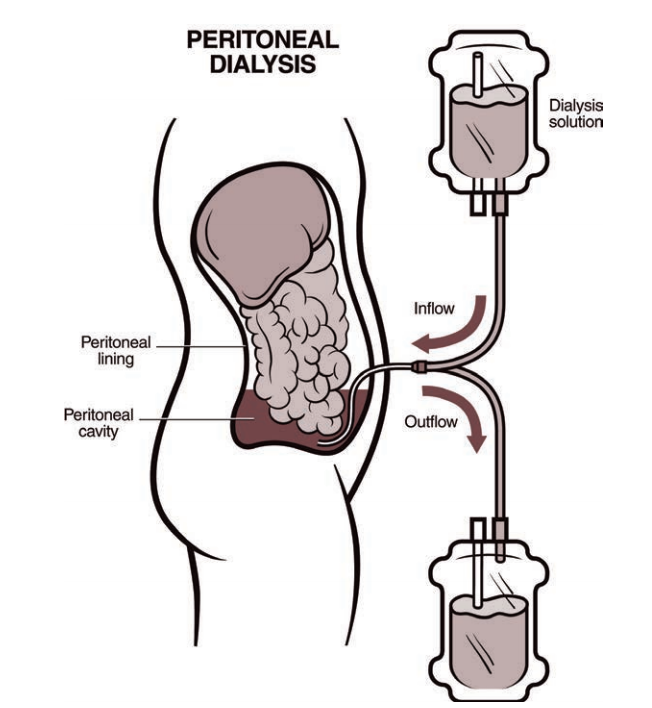A client is receiving continuous ambulatory peritoneal dialysis since the arteriovenous (AV) graft in the right arm is no longer available for use for hemodialysis. The client has lost weight, has increasing peripheral edema, and has a serum albumin level of 1.5 g/dL (15 g/L). Which intervention is the priority for the nurse to implement?
Serum Albumin Reference Range: 3.5 to 5.5 g/dL (35 to 55 g/L)
Recommend the use of support stockings to enhance venous return
Ensure the client receives frequent small meals containing complete proteins
Evaluate patency of the AV graft for resumption of hemodialysis
Instruct the client to continue to follow the prescribed rigid fluid restriction amounts
The Correct Answer is B
Choice A reason: Support stockings may help with peripheral edema, but they are not the priority intervention for this client. The client's low serum albumin level indicates malnutrition and increased risk of infection and poor wound healing.
Choice C reason: Evaluating patency of the AV graft is not the priority intervention for this client because the client is receiving peritoneal dialysis, not hemodialysis. The AV graft may be used in the future if peritoneal dialysis fails, but it is not an immediate concern.
Choice D reason: Instructing the client to follow fluid restriction amounts is important for peritoneal dialysis patients, but it is not the priority intervention for this client. The client's low serum albumin level indicates that fluid restriction alone is not sufficient to manage fluid balance and prevent edema.

Nursing Test Bank
Naxlex Comprehensive Predictor Exams
Related Questions
Correct Answer is ["A","B","E"]
Explanation
Choice C reason: Initiating patient controlled analgesia (PCA. pumps for two clients immediately postoperatively is not a nursing action that can be assigned to the PN. PCA pump is a device that allows the client to self-administer pain medication through an IV line by pressing a button. PCA pump should be initiated by the nurse after verifying the prescription, setting the parameters, educating the client, and ensuring safety and effectiveness. The PN does not have the authority or competency to initiate PCA pump or adjust its settings.
Choice D reason: Starting the second blood transfusion for a client twelve hours following a below knee amputation is not a nursing action that can be assigned to the PN. Blood transfusion is a procedure that delivers donated blood or blood products into the client's bloodstream through an IV line. Blood transfusion should be started by the nurse after verifying the prescription, checking the blood type and compatibility, obtaining informed consent, and monitoring for any adverse reactions. The PN does not have the authority or competency to start blood transfusion or manage its complications.
Correct Answer is C
Explanation
Choice A: Monitoring indwelling urinary catheter and measure strict intake and output is not an action that the nurse should immediately take, as this is not relevant or urgent for a client who may have had a stroke. This is a distractor choice.
Choice B: Keeping the bed in the lowest position and initiating seizure and fall precautions is not an action that the nurse should immediately take, as this is a preventive measure that does not address the acute problem of impaired cerebral perfusion. This is another distractor choice.
Choice C: Starting two large bore IV catheters and reviewing inclusion criteria for IV fibrinolytic therapy is an action that the nurse should immediately take, as this can prepare the client for potential administration of tissue plasminogen activator (tPA., which can dissolve blood clots and restore blood flow to the brain if given within 4.5 hours of stroke onset. Therefore, this is the correct choice.
Choice D: Maintaining elevated positioning of the dependent joints on affected side is not an action that the nurse should immediately take, as this can worsen edema and impair circulation in the affected limbs. The recommended position is to keep them at or below heart level. This is another distractor choice.
Whether you are a student looking to ace your exams or a practicing nurse seeking to enhance your expertise , our nursing education contents will empower you with the confidence and competence to make a difference in the lives of patients and become a respected leader in the healthcare field.
Visit Naxlex, invest in your future and unlock endless possibilities with our unparalleled nursing education contents today
Report Wrong Answer on the Current Question
Do you disagree with the answer? If yes, what is your expected answer? Explain.
Kindly be descriptive with the issue you are facing.
